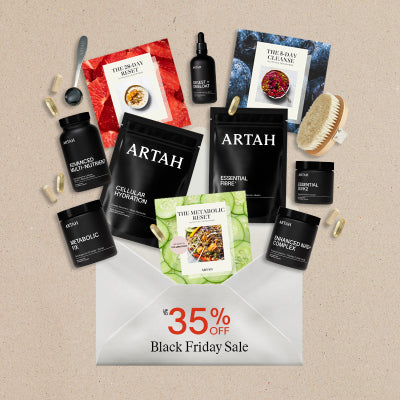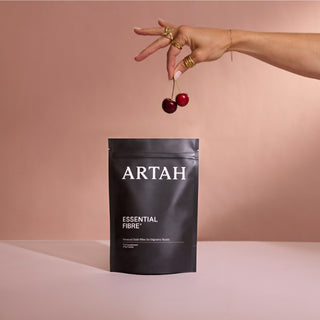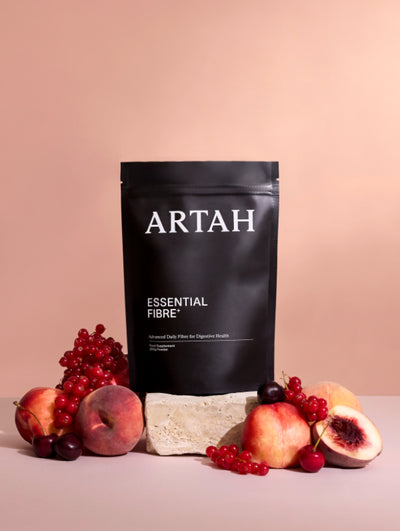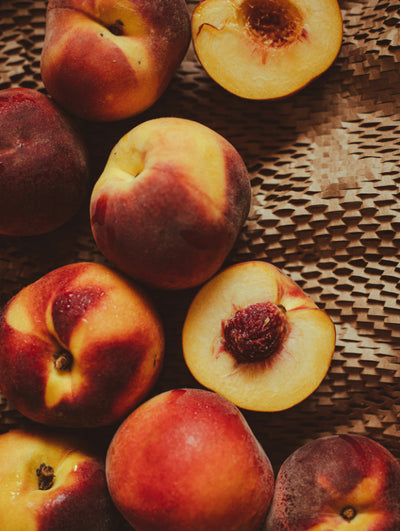When we’re in our 30s, menopause is usually the last thing on our mind. But, everything we do in this decade sets us up for the next, which means that the state of our health and well-being as we leave our 30s is incredibly influential to how we experience perimenopause and menopausal changes. The average age of menopause in the UK is 51, but we can start to experience changes in our hormones and metabolism up to 10 years in advance, known as perimenopause. These changes can affect menstrual cycle (length, flow, ovulation), hormone balance, blood sugar, focus, the stress response, energy and more. Whilst focusing on hormone health is beneficial at any age, this decade is an ideal time to master the principles practices that set us up to thrive at any age. Here are 4 things to focus on.
Stress Management
Hormonal changes in perimenopause can drive a decline in stress resilience, leaving us feeling like we can't cope with challenges in the way that we used to. Our ovaries produce the majority of our sex hormones throughout our reproductive years, but as we go through perimenopause, the production of oestrogen and progesterone decline, with the adrenal glands eventually taking over (1) Adrenal glands are most known for their role in the stress response; they produce adrenaline, cortisol, and other hormones that are involved in or affected by our stress response and sleep/wake cycle. Since many of us live with consistent stress, the adrenal glands can become exhausted, and their ability to produce these hormones becomes compromised which can exacerbate symptoms of perimenopause. It’s crucial to support our adrenals now to take care of our hormone production later.
What to do:
Find a stress management tool that works for you and use it consistently. Our favourite is breath work, but anything will work as long as it's something that can become habitual . Yoga, meditation, therapy, journalling and dedicated tech-free time are some other examples.What to try:
Enhanced Nootropics: designed to support emotional wellbeing and combat fatigue, this formula includes the B Complex Vitamins, which support and protect the adrenals, and can help decrease the stress-induced cortisol response (4) It also has Ashwagandha KSM-66, which helps to regulate cortisol activity and support stress resilience (5), and Magnesium, known as the calming mineral, which is important for nervous system regulation A 2021 study showed that women taking Ashwagandha reported a reduction in hot flashes and an improvement in oestradiol, FSH, and luteinizing hormone. (6)
Strength Training
Muscle mass gradually decreases as we age and in our 30s, we start to lose muscle mass at a rate of around 3-8% per decade. (7) Muscles are associated with strength and mobility but is also considered as metabolic currency. It’s the largest site for non-insulin dependent glucose metabolism, which is critical to support healthy insulin levels. Insulin resistance is a risk factor associated with menopause; (8). oestrogen is muscle-protective and helps improves strength (9), but the decline in oestrogen during perimenopause can lead to muscle loss, bone density loss and an increase in visceral fat (10). It’s crucial to prioritise movement and nutrition to support and maintain mass and health.
What to eat:
Protein. It provides the building blocks for muscle tissue. Aim to eat 1-1.2g of protein per kg of bodyweight for example 60kg = at least 60g protein per dayWhat to do:
Strength training – to build and maintain muscle. Prioritise weight training, reformer Pilates, and/or resistance band training 3-4x a week. If this sounds daunting, try not to worry; even 20 minute sessions can be beneficial.
Blood Sugar Balance
Oestrogen has many beneficial effects on the body, one of which is helping us maintain insulin sensitivity and regulate blood sugar. Declining oestrogen can contribute to, insulin resistance, poor blood sugar control, and an increase in visceral fat (the more dangerous fat around the belly) (11). Cracking the blood sugar code is essential for energy, focus, metabolic health, and menstrual health as well as menopause, so focusing on it now can be hugely beneficial later on
What to eat:
Protein, fat and fibre. This is the perfect cocktail for balancing blood glucose and promoting a healthy insulin response. In combination, these macronutrients help to buffer the absorption of sugar and promote fullness by triggering the appetite suppression hormone, leptin. Protein we love includes organic grass-fed chicken, beef, turkey, wild salmon, cod, hake haddock, sardines, beans, pulses, tofu, tempeh. Fats we love include avocado, olive oil, avocado oil, nuts, seeds, olives, natural nut butters, tahini Fibre we love includes pak choi, broccoli, peppers, tomatoes, celery, cauliflower, green leaves – lettuce, rocket, watercress, cucumber, aubergine, courgette, radish, beans, flax, nuts, seeds, squash, artichoke,
What to try:
Chromium plays a key role in supporting healthy glucose metabolism, and it’s been shown to help cravings and regulate food intake. (14) Consider Metabolic Fix which combines Chromium with Berberine, Cinnamon and other powerful phytonutrients and botanicals that help support energy and combat cravings.
Detoxification/Liver Health
Our liver is known as the “filter” for our body due to its key role in detoxification - it can filter 1.6 litres of blood per minute and is responsible for the detoxification of everything from environmental toxins and food chemicals to medications and alcohol. The balance of our hormones is dependent of how well our livers are functioning because in addition to the above, the liver also helps process and excrete hormones, which is essential for to help regulate our cycle and ease PMS. During perimenopause, the liver has to contend with extreme fluctuations of oestrogen and efficiently detoxify them to lessen menopausal symptoms and avoid oestrogen dominance in the body which is a factor in breast cancer. (12)
What to eat:
Diindolylmethane (DIM) is a natural compound found in the cruciferous vegetable family which supports oestrogen metabolism. Include lots of broccoli, Brussels sprouts, cauliflower, pak choi, cabbage, rocket and watercress. We recommend including 3x sources daily.
What to try:
Deep Detox, a formula containing antioxidants and amino acids that support the liver and enhance the body’s natural detoxification pathways. This formula contains Milk Thistle which is liver-protective (13), N-acetyl Cysteine to support detoxification and boost glutathione production, Choline for healthy liver function, and Alpha Lipoic Acid for powerful antioxidant support.
Disclaimer: The information presented in this article is for educational purposes only and is not intended to diagnose, prevent, or treat any medical or psychological conditions. The information is not intended as medical advice, nor should it replace the advice from a doctor or qualified healthcare professional. Please do not stop, adjust, or modify your dose of any prescribed medications without the direct supervision of your healthcare practitioner.
References:
1.Davey DA. Androgens in Women before and after the Menopause and Post Bilateral Oophorectomy: Clinical Effects and Indications for Testosterone Therapy. Women’s Health. 2012;8(4):437-446. doi:10.2217/WHE.12.27
- Obaya HE, Abdeen HA, Salem AA, Shehata MA, Aldhahi MI, Muka T, Marques-Sule E, Taha MM, Gaber M, Atef H. Effect of aerobic exercise, slow deep breathing and mindfulness meditation on cortisol and glucose levels in women with type 2 diabetes mellitus: a randomized controlled trial. Front Physiol. 2023 Jul 13;14:1186546. doi: 10.3389/fphys.2023.1186546. PMID: 37520826; PMCID: PMC10373883.
- Lovallo WR, Whitsett TL, al'Absi M, Sung BH, Vincent AS, Wilson MF. Caffeine stimulation of cortisol secretion across the waking hours in relation to caffeine intake levels. Psychosom Med. 2005 Sep-Oct;67(5):734-9. doi: 10.1097/01.psy.0000181270.20036.06. PMID: 16204431; PMCID: PMC2257922.
4.Meletis CD, Zabriskie NL, Rountree B. Clinical Natural Medicine Handbook. New Rochelle, NY: Mary Ann Liebert, Inc., Publishers; 2008.
- Wiciński M, Fajkiel-Madajczyk A, Kurant Z, Kurant D, Gryczka K, Falkowski M, Wiśniewska M, Słupski M, Ohla J, Zabrzyński J. Can Ashwagandha Benefit the Endocrine System?-A Review. Int J Mol Sci. 2023 Nov 20;24(22):16513. doi: 10.3390/ijms242216513. PMID: 38003702; PMCID: PMC10671406.
- Gopal S, Ajgaonkar A, Kanchi P, Kaundinya A, Thakare V, Chauhan S, Langade D. Effect of an ashwagandha (Withania Somnifera) root extract on climacteric symptoms in women during perimenopause: A randomized, double-blind, placebo-controlled study. J Obstet Gynaecol Res. 2021 Dec;47(12):4414-4425. doi: 10.1111/jog.15030. Epub 2021 Sep 22. PMID: 34553463.
- 7. Volpi E, Nazemi R, Fujita S. Muscle tissue changes with aging. Curr Opin Clin Nutr Metab 2004 Jul;7(4):405-10. doi: 10.1097/01.mco.0000134362.76653.b2. PMID: 15192443; PMCID: PMC2804956.
- 8. Merz KE, Thurmond DC. Role of Skeletal Muscle in Insulin Resistance and Glucose Uptake. Compr 2020 Jul 8;10(3):785-809. doi: 10.1002/cphy.c190029. PMID: 32940941; PMCID: PMC8074531.
- 9. Chidi-Ogbolu N, Baar Effect of Estrogen on Musculoskeletal Performance and Injury Risk. Front Physiol. 2019 Jan 15;9:1834. doi: 10.3389/fphys.2018.01834. PMID: 30697162; PMCID: PMC6341375.
- 10. Maltais ML, Desroches J, Dionne IJ. Changes in muscle mass and strength after menopause. J Musculoskelet Neuronal Interact. 2009 Oct-Dec;9(4):186-97. PMID: 19949277.
- 11. Yan H, Yang W, Zhou F, Li X, Pan Q, Shen Z, Han G, Newell-Fugate A, Tian Y, Majeti R, Liu W, Xu Y, Wu C, Allred K, Allred C, Sun Y, Guo S. Estrogen Improves Insulin Sensitivity and Suppresses Gluconeogenesis via the Transcription Factor Foxo1. Diabetes. 2019 Feb;68(2):291-304. doi: 10.2337/db18-0638. Epub 2018 Nov 28. PMID: 30487265; PMCID: PMC6341301.
- 12. Nomura SJO, Hwang YT, Gomez SL, Fung TT, Yeh SL, Dash C, Allen L, Philips S, Hilakivi-Clarke L, Zheng YL, Wang JH. Dietary intake of soy and cruciferous vegetables and treatment-related symptoms in Chinese-American and non-Hispanic White breast cancer survivors. Breast Cancer Res Treat. 2018 Apr;168(2):467-479. doi: 10.1007/s10549-017-4578-9. Epub 2017 Dec 11. Erratum in: Breast Cancer Res Treat. 2018 Apr;168(2):481-482. doi: 10.1007/s10549-017-4634-5. PMID: 29230660; PMCID: PMC5928523.
- 13. Mulrow C, Lawrence V, Jacobs B, et al. Milk Thistle: Effects on Liver Disease and Cirrhosis and Clinical Adverse Effects: Summary. 2000. In: AHRQ Evidence Report Summaries. Rockville (MD): Agency for Healthcare Research and Quality (US); 1998-2005. 21. Available from: https://www.ncbi.nlm.nih.gov/books/NBK11896/
- National Institutes of Health Chromium Fact Sheet for Professionals: https://ods.od.nih.gov/factsheets/Chromium-HealthProfessional/#h6



















































